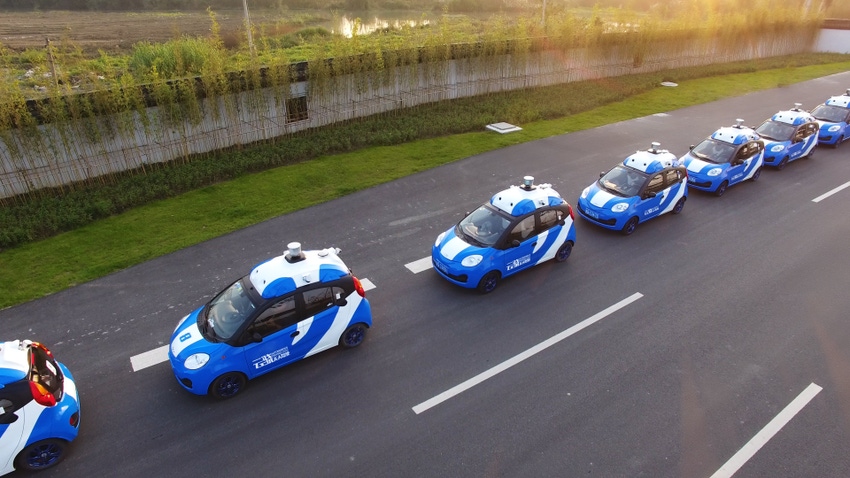Baidu Wants to Democratize Autonomous Vehicle Development
Chinese search engine company Baidu is looking to make its own name in autonomous vehicles, with a platform that will make creating self-driving vehicle easier for all developers.
May 11, 2017

There's a search engine giant getting into the autonomous vehicles game, and it's not Google. Chinese search engine company Baidu has announced an autonomous vehicle development platform, called Project Apollo, that it says will democratize autonomous driving.
“We are at a time when we need to turn autonmous driving from a research project into a commercial production," Gu Weihao, General Manager of Baidu's Intelligent Vehicle Business Unit, said at talk at the GPU Technology Conference (GTC) 2017 in San Jose, Calif. “If our mission is to transform the future of mobility we have to democratize autonomous driving.”
Named after the Apollo space program, Baidu hopes its platform will have the same ground-breaking impact as its namesake. “We opened the platform in order to encourage greater innovation and opportunities. By making better use of our technologies we can drive the evolution of the whole industry,” Weihao said.
|
Baidu's Project Apollo is targeted around letting autonomous vehicle developers solve problems around highway driving, parking, and driving in enclosed zones. (Image source: Baidu). |
Project Apollo is a full package platform for Baidu's automotive partners to build self-driving vehicles. It includes hardware and software components as well as a cloud-based service. The company hopes to have vehicles developed alongside its partners deployed in some restricted environments as soon as the end of 2017, with an eye on highways and open cities by 2020.
Weihao told the audience that Baidu has identified three key problem areas for autonomous vehicle manufacturers that Apollo is targeted at solving. The first area is highway driving, “because it accounts for more than half of all driving,” Weihao said. Second is automatic parking, having vehicles being able to safely navigate and store themselves in parking lots and structures. Third is what Baidu calls the enclosed zone of driving, which revolves around commercial vehicles and trucks moving around a set space (like a factory complex or airport, fro example) rather than an open highway or road.
“One-third of commercial fleet cost is staff, one-third is fuel, and one-third is the vehicle itself,” Weihao said, adding that because vehicles in an enclosed space can run at a low speed along a fixed path they are an ideal application for autonomous driving, which would significantly lower costs across the board.
Baidu has chosen to build Apollo as a GPU-based platform, as GPUs offer a level of software acceleration that CPUs can't match, meaning they can handle a lot of the robust processing required for real time autonomous driving. One of the foundations of the Apollo platform for example is HD map data processing, which creates a virtual environment for the car in real time. Sensor data (lidar, radar, GPS, ect.) feeds into the HD map, allowing for self-localization, letting the vehicle know where it is in relation to objects in space as well as other vehicles – both key points for keeping a self-driving car on the road and away from collisions.
Though it isn't mentioned as readily as other companies like Tesla and Google, Baidu has been conducting R&D into the autonomous vehicles space since 2015, when it conducted successful road tests for autonmous cars in Beijing. It also received a permit for autonomous vehicle testing in California in 2016 and in November of that same year Baidu conducted a trail run of its autonmous car fleet in Wuzhen, Zhejiang Province in China.
In a press statement Qi Lu, Group President and Chief Operating Officer at Baidu said, "China is the world's largest market for automotive sales and production. It has many car brands and an open environment that is ripe for collaboration. ... An open, innovative industry ecosystem initiated by Baidu will accelerate the development of autonomous driving in the US and other developed automotive markets."
2017 Call for Speakers Smart Manufacturing Innovation Summit at Atlantic Design & Manufacturing. Designed for industry professionals looking to overcome plant and enterprise-level manufacturing challenges using IT-based solutions. Immerse yourself in the latest developments during the two-day, expert-led Smart Manufacturing Innovation Summit. You'll get the latest on the factory of future including insights into Industrial IoT and IIoT applications, predictive maintenance, intelligent sensors, security, and harmonizing IT/OT. June 13-15, 2017. Register Today! |
Chris Wiltz is the Managing Editor of Design News.
About the Author(s)
You May Also Like


.jpg?width=300&auto=webp&quality=80&disable=upscale)


